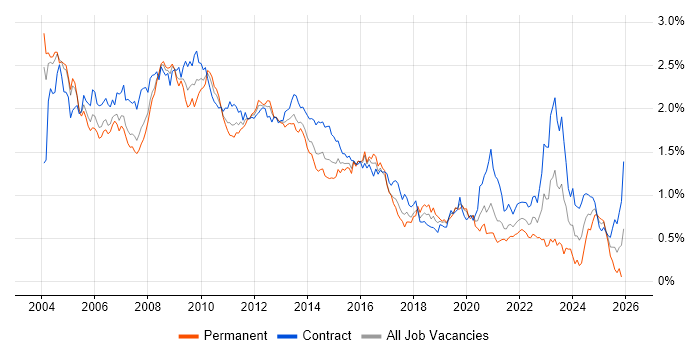PL/SQL (PLSQL)
Central London > City of London
The table below provides summary statistics for permanent job vacancies advertised in the City of London requiring PL/SQL skills. It includes a benchmarking guide to the annual salaries offered in vacancies that cited PL/SQL over the 6 months leading up to 31 May 2025, comparing them to the same period in the previous two years.
| 6 months to 31 May 2025 |
Same period 2024 | Same period 2023 | |
|---|---|---|---|
| Rank | 126 | 165 | 208 |
| Rank change year-on-year | +39 | +43 | +40 |
| Permanent jobs citing PL/SQL | 13 | 13 | 22 |
| As % of all permanent jobs advertised in the City of London | 0.66% | 0.39% | 0.49% |
| As % of the Programming Languages category | 1.44% | 0.84% | 0.95% |
| Number of salaries quoted | 13 | 7 | 20 |
| 10th Percentile | - | - | £49,275 |
| 25th Percentile | £62,500 | £51,000 | £50,000 |
| Median annual salary (50th Percentile) | £65,000 | £54,000 | £60,000 |
| Median % change year-on-year | +20.37% | -10.00% | -4.00% |
| 75th Percentile | £67,500 | £74,375 | £73,438 |
| 90th Percentile | £76,500 | £87,500 | £106,250 |
| Central London median annual salary | £65,000 | £54,000 | £60,000 |
| % change year-on-year | +20.37% | -10.00% | -4.00% |
All Programming Languages
City of London
PL/SQL falls under the Programming Languages category. For comparison with the information above, the following table provides summary statistics for all permanent job vacancies requiring coding skills in the City of London.
| Permanent vacancies with a requirement for coding skills | 904 | 1,546 | 2,306 |
| As % of all permanent jobs advertised in the City of London | 46.22% | 46.20% | 51.52% |
| Number of salaries quoted | 753 | 1,233 | 2,071 |
| 10th Percentile | £52,500 | £47,500 | £50,000 |
| 25th Percentile | £61,250 | £60,000 | £60,000 |
| Median annual salary (50th Percentile) | £80,000 | £80,000 | £77,500 |
| Median % change year-on-year | - | +3.23% | +3.33% |
| 75th Percentile | £105,000 | £97,500 | £103,750 |
| 90th Percentile | £129,500 | £115,000 | £117,500 |
| Central London median annual salary | £80,000 | £77,500 | £77,500 |
| % change year-on-year | +3.23% | - | +3.33% |
PL/SQL
Job Vacancy Trend in the City of London
Job postings citing PL/SQL as a proportion of all IT jobs advertised in the City of London.

PL/SQL
Salary Trend in the City of London
3-month moving average salary quoted in jobs citing PL/SQL in the City of London.
PL/SQL
Co-occurring Skills and Capabilities in the City of London by Category
The follow tables expand on the table above by listing co-occurrences grouped by category. The same employment type, locality and period is covered with up to 20 co-occurrences shown in each of the following categories:
